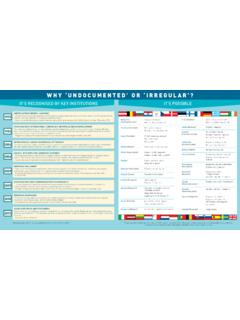Transcription of Immigration Reform
1 Immigration Reform 1 Immigration Reform August 2021 Why is Immigration Reform important? An estimated million undocumented immigrants live in the United States and could be deported because of their lack of legal That number has declined since 2014. Approximately two-thirds have lived in the United States for more than a These individuals and their families participate in the workforce and contribute to their communities. However, they are at risk of mistreatment and exploitation because of their legal status, not to mention constantly at risk of deportation.
2 Trying to deport millions of people to their home country would be unworkable and only serve to fragment families and harm local communities. Immigration Reform should include a legalization process that would provide protections for these vulnerable individuals and their families, as it would allow undocumented persons to integrate as full participants in American life and society. While the existing Immigration system is mostly family-based with procedures that help reunite and keep families together, immediate family members of legal permanent residents often must wait ten years or longer to legally join their loved ones in the In recent years, there have been efforts to dismantle the family-based Immigration system, which the Catholic Church It is critical to maintain an emphasis on family unity in the Immigration system and craft legislation that will protect and strengthen family-based Immigration .
3 What should Immigration Reform legislation include? In their 2003 pastoral statement Strangers No Longer: Together on the Journey of Hope,4 the Catholic bishops outlined five principles of migration and highlighted the need for systemic To this end, the Catholic Church in the has consistently advocated for Immigration Reform legislation that will: 1. Ensure access to permanent legal status and a path to citizenship for current residents. Given the millions of hardworking, undocumented persons already living in the United States some for many years legalization provisions are a necessary part of any Reform .
4 At a minimum, these should cover Dreamers, Temporary Protected Status (TPS)/Deferred Enforced Departure (DED) holders, migrant agricultural workers, and other undocumented essential workers. 2. Reaffirm and prioritize family unity and reunification. Any Reform legislation should contain language that strengthens families and maintains the long-standing family unity emphasis in Immigration law. Such family-focused policies include: (1) measures that establish legal pathways and waivers that enable families to maintain unity or restore it for those families already torn apart; (2) removal of the three- and ten-year bars to lawful Immigration ; (3) utilizing prior, unused family-based Immigration visas; and (4) mechanisms that will clear current backlogs and ensure timely family reunification.
5 3. Reform the Immigration detention system. Immigration Reform legislation should eliminate the use of detention as a method of deterrence, end the use of for-profit corporations in Immigration detention, reserve detention only for individuals who are national security or public safety threats, expand and prioritize community-based alternatives to detention (ATDs), which ensure Immigration compliance in a humane way, and include other reforms that aptly protect vulnerable migrants and their families. The Justice for Immigrants (JFI) campaign was established by the Conference of Catholic Bishops and a diverse group of Catholic organizations in 2004 to unite and mobilize a growing network of Catholic institutions and individuals, as well as other persons of goodwill, in support of Immigration Reform .
6 Visit to learn more. Immigration Reform 2 4. Evaluate and revise Immigration enforcement strategies, both along the border and within the interior, to ensure the just and humane treatment of all migrants. Border management should reflect broader economic and humanitarian interests and prioritize the wellbeing of local communities. This requires a prohibition on the use of military resources and personnel along the border, as well as the separation of local policing from interior enforcement. Additionally, Reform legislation should require the identification and protection of vulnerable populations such as children as part of any interior enforcement strategy.
7 5. Promote access to asylum and due process. Immigration Reform legislation should limit policies that place undue burdens on asylum and instead establish reasonable and achievable pathways to citizenship for refugees and asylum seekers. To facilitate this, universal access to pro bono legal programs must be supported. 6. Adopt policies that address the root causes of migration. Political and religious persecution, environmental degradation, and economic underdevelopment and exclusion have long been factors driving people to leave their homelands.
8 Truly comprehensive and effective Immigration Reform cannot occur without including policies that will mitigate the drivers of irregular migration and promote interventions that allow people to thrive in their homeland. Anti-trafficking measures and efforts to oppose transnational organized crime that respect victims should be included among these policies. Why is a legislative solution necessary? For decades, Congress has failed to meaningfully address Immigration Reform through legislation. This has contributed to the tendency for Immigration policies to be decided by the executive branch, leading to inconsistent approaches as one administration transitions into another.
9 This is untenable and must be resolved by a legislative solution. Immigration Reform legislation would reintroduce consistency and modernize our existing Immigration system for the benefit of all. Additionally, only Congress has the power to enact laws that will promote integration for long-time residents of the United States and provide pathways to citizenship. Among those dwelling in those existential peripheries, we find many migrants and refugees, displaced persons and victims of trafficking, to whom the Lord wants his love to be manifested and his salvation preached.
10 Pope Francis, Message for the 107th World Day of Migrants and Refugees (2021) Endnotes 1 Abby Budiman, Key Findings About Immigrants, PEW RESEARCH CENTER (Aug. 20, 2020), 2 Jens Manuel Krogstad, et al., 5 Facts About Illegal Immigration in the , PEW RESEARCH CENTER (June 12, 2019), 3 Justice for Immigrants, The Importance of Maintaining a Family-Based Immigration System (Dec. 2020), 4 Conference of Catholic Bishops, Strangers No Longer: Together on the Journey of Hope (Jan. 22, 2003), 5 Justice for Immigrants, Catholic Principles of Migration (2019.)

